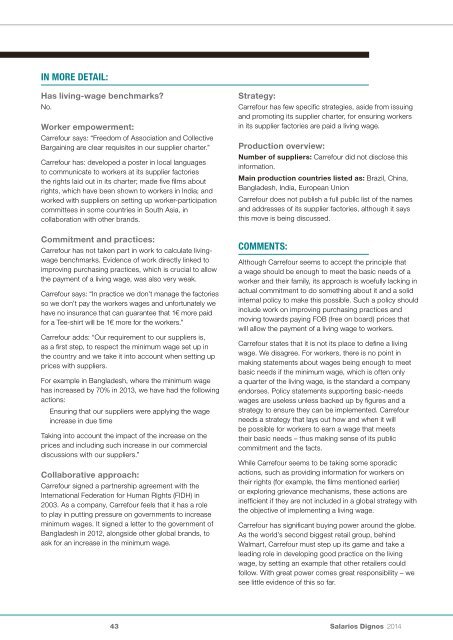17Investigación SALARIOS dignos definitiva
17Investigación SALARIOS dignos definitiva
17Investigación SALARIOS dignos definitiva
You also want an ePaper? Increase the reach of your titles
YUMPU automatically turns print PDFs into web optimized ePapers that Google loves.
IN MORE DETAIL:<br />
Has living-wage benchmarks<br />
No.<br />
Worker empowerment:<br />
Carrefour says: “Freedom of Association and Collective<br />
Bargaining are clear requisites in our supplier charter.”<br />
Carrefour has: developed a poster in local languages<br />
to communicate to workers at its supplier factories<br />
the rights laid out in its charter; made five films about<br />
rights, which have been shown to workers in India; and<br />
worked with suppliers on setting up worker-participation<br />
committees in some countries in South Asia, in<br />
collaboration with other brands.<br />
Commitment and practices:<br />
Carrefour has not taken part in work to calculate livingwage<br />
benchmarks. Evidence of work directly linked to<br />
improving purchasing practices, which is crucial to allow<br />
the payment of a living wage, was also very weak.<br />
Carrefour says: “In practice we don’t manage the factories<br />
so we don’t pay the workers wages and unfortunately we<br />
have no insurance that can guarantee that 1€ more paid<br />
for a Tee-shirt will be 1€ more for the workers.”<br />
Carrefour adds: “Our requirement to our suppliers is,<br />
as a first step, to respect the minimum wage set up in<br />
the country and we take it into account when setting up<br />
prices with suppliers.<br />
For example in Bangladesh, where the minimum wage<br />
has increased by 70% in 2013, we have had the following<br />
actions:<br />
Ensuring that our suppliers were applying the wage<br />
increase in due time<br />
Taking into account the impact of the increase on the<br />
prices and including such increase in our commercial<br />
discussions with our suppliers.”<br />
Collaborative approach:<br />
Carrefour signed a partnership agreement with the<br />
International Federation for Human Rights (FIDH) in<br />
2003. As a company, Carrefour feels that it has a role<br />
to play in putting pressure on governments to increase<br />
minimum wages. It signed a letter to the government of<br />
Bangladesh in 2012, alongside other global brands, to<br />
ask for an increase in the minimum wage.<br />
Strategy:<br />
Carrefour has few specific strategies, aside from issuing<br />
and promoting its supplier charter, for ensuring workers<br />
in its supplier factories are paid a living wage.<br />
Production overview:<br />
Number of suppliers: Carrefour did not disclose this<br />
information.<br />
Main production countries listed as: Brazil, China,<br />
Bangladesh, India, European Union<br />
Carrefour does not publish a full public list of the names<br />
and addresses of its supplier factories, although it says<br />
this move is being discussed.<br />
COMMENTS:<br />
Although Carrefour seems to accept the principle that<br />
a wage should be enough to meet the basic needs of a<br />
worker and their family, its approach is woefully lacking in<br />
actual commitment to do something about it and a solid<br />
internal policy to make this possible. Such a policy should<br />
include work on improving purchasing practices and<br />
moving towards paying FOB (free on board) prices that<br />
will allow the payment of a living wage to workers.<br />
Carrefour states that it is not its place to define a living<br />
wage. We disagree. For workers, there is no point in<br />
making statements about wages being enough to meet<br />
basic needs if the minimum wage, which is often only<br />
a quarter of the living wage, is the standard a company<br />
endorses. Policy statements supporting basic-needs<br />
wages are useless unless backed up by figures and a<br />
strategy to ensure they can be implemented. Carrefour<br />
needs a strategy that lays out how and when it will<br />
be possible for workers to earn a wage that meets<br />
their basic needs – thus making sense of its public<br />
commitment and the facts.<br />
While Carrefour seems to be taking some sporadic<br />
actions, such as providing information for workers on<br />
their rights (for example, the films mentioned earlier)<br />
or exploring grievance mechanisms, these actions are<br />
inefficient if they are not included in a global strategy with<br />
the objective of implementing a living wage.<br />
Carrefour has significant buying power around the globe.<br />
As the world’s second biggest retail group, behind<br />
Walmart, Carrefour must step up its game and take a<br />
leading role in developing good practice on the living<br />
wage, by setting an example that other retailers could<br />
follow. With great power comes great responsibility – we<br />
see little evidence of this so far.<br />
43<br />
Salarios Dignos 2014


